PC piracy survey results: 35 percent of PC gamers pirate
50,000 PC gamers told us whether they pirate games, and why.

At some point in their lives, 90 percent of PC gamers have pirated a game. Almost 25 percent of PC gamers have pirated more than 50 games in their lifetimes. Those are two statistics from an anonymous survey we put up on PC Gamer two weeks ago after publishing an investigation into piracy in 2016. We hoped for a few thousand responses. We got 50,742, from PC gamers living in dozens of countries around the world. That’s a lot of data.
Before we dig into the results, it’s important to note that this was an open survey, with nothing to stop the respondents from lying or taking it multiple times to skew the results. It’s possible some respondents answered in bad faith—and we have identified where the results skew in jokey ways—but given the size of our response pool, we believe the resulting answers paint a credible picture of piracy in 2016.
Whenever we look for existing data on PC piracy, what we find seems sketchy or poorly sourced. In 2012, Ubisoft’s CEO famously said that 93 percent of PC gamers pirate. As we referenced in our piracy feature, marketing research company Tru Optik claimed 2.4 billion games were downloaded in 2014 across PC, mobile, consoles, etc. There’s no way to know how many of those were PC games, but they are by far the most common game download available on The Pirate Bay. But now we have some data of our own, and it tells a believable story. From our results, it’s true that 90 percent of PC gamers have pirated games at some point in their lives. But today, in 2016?
Of the PC gamers who responded to our survey, 35 percent are active pirates.
How many PC gamers pirate?
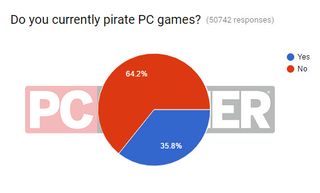
The simplest result from our survey is this number, a raw count of how many PC gamers currently download games without paying for them. Certainly not a small number, but a far cry from 90 percent. As we learned from another question, services like Steam and GOG have had a big impact on piracy, much in the way iTunes affected MP3 downloads. When games became as easy to buy as it was to pirate, many pirates started pulling out their wallets.
Still, 35 percent is a lot of PC gamers. Let’s dig into who is pirating, and their reasons why.
Who pirates PC games?
We asked our survey respondents for three identifying characteristics: their age, their country of residence, and their approximate income.
Comic deals, prizes and latest news
Sign up to get the best content of the week, and great gaming deals, as picked by the editors.

This chart shows the percentage of people who pirate within each age range. As you might expect, younger respondents were the most likely to pirate, with that likelihood decreasing about five percent per age group between 16-20 and 51-60. More than 40 percent of teenagers said they currently pirate games, while less than 15 percent of 51-60 year olds said the same.
The 60+ age group skyrockets back up to 25 percent, which is likely heavily skewed by joke responses to the survey. Only 77 respondents out of 50,000 (about 0.15 percent) selected this age range.
We also only got 78 responses for the 10 or younger age range, and of those, 27 said they had annual incomes greater than $10,000. Quite a few said $150,000+. Trolls, or very enterprising children who pirate games? Probably the former.
With thousands of responses in each other age range, they should provide a much more accurate picture of who pirates games.

This chart shows the percentage of pirates within income ranges. No big surprise here: the majority of pirates have the lowest annual income, at below $10,000. Almost 50 percent of our respondents in this category pirate games, while half that number of gamers pirate if they make more than $25,000 per year.
Again, you'll notice a suspicious rise in the piracy rate in the far-right bar, which is survey respondents who claimed to make more than $150,000 per year. Only 576 respondents chose this income bracket, and 41 of those said they were under 10 or over 60. We're skeptical there, but perhaps our wealthiest respondents prefer to spend their money on champagne instead of PC games.
Because this answer wasn't required, about 4,000 respondents left it blank.
Below is a chart breaking down where most of our responses came from.
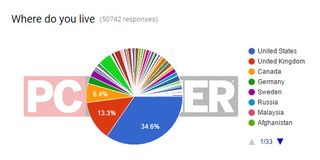
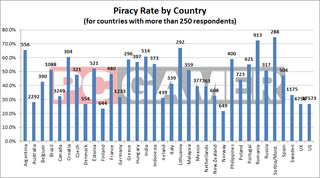
As you can see from the chart above, nearly half of our survey respondents lived in the US and the UK. Australia (the bright green wedge) and Canada made up another 10 percent, while Germany, Sweden and Brazil each accounted for 2+ percent shares with more than 1,000 responses each.
Some highlights from the piracy breakdown per country: Serbia and Romania had the highest piracy rates among our respondents at close to 75 percent. Lithuania and Argentina were both over 60 percent. Russia, often cited as a country where pirating runs rampant, was right at the 50 percent mark.
In our report on the state of PC piracy we spoke to a pirate who lives in Bulgaria, who explained a new game on release day costs almost a third of a minimum wage earner's monthly income (imagine new games costing $400 in the US). “The thing is, they think $50 and €50 is the same for every country, but it's not, because the wages and economy are different,” said the pirate, who goes by the handle Overkill online.
Looking at a list of average wages in Europe, many countries with high piracy rates (like the ones mentioned above) sit near the bottom of that list. Denmark and Norway, with piracy rates around 26 percent and 22 percent, according to our respondents, have the 6th and 3rd highest net incomes in Europe.
Those stark differences in piracy rate where income differs so drastically can't prove causation, but it sure looks like strong evidence to back up Overkill's claim. More localized pricing across Europe that better took into account income in each country could conceivably have a big impact on piracy values.
Both the US and UK, which had by far the most respondents in our survey, showed piracy rates of around 26 percent. 4,695 US respondents said they pirate games, and 1,793 UK respondents answered the same.
Why do they pirate PC games?
We asked gamers if they think pirating games is wrong, with options that didn't leave a ton of room for nuance: 'Yes,' 'No,' 'Yes but I do it anyway,' and 'It depends on who made the game.' We did have an 'Other' write-in option, and you can find some of those results on the next page.
Here's the basic breakdown of how our respondents view piracy.
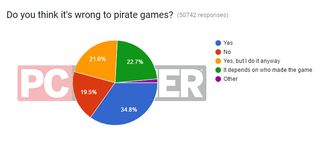
'Why' is the toughest question to answer, and the most likely to result in some questionable feedback. Our survey offered several common reasons pirates often state for downloading games and said check all that apply. After some debate, we included 'Because I don't want to give ___ developer/publisher my money' as one of those options. It's a reason people often state for pirating a game, but is that really the why, or it it simply a justification, with the real answer being 'don't want to pay?'
We can't answer that, but we can show the answers we were given. Here's how the results panned out, broken down by age, income, and country.
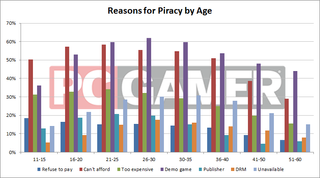
The youngest and oldest gamers cared about DRM the least, and the oldest gamers were also the least likely to flat-out refuse to pay for a game, or to pirate it because they didn't like the publisher.
From their 20s to mid-30s, almost 60 percent of gamers said they pirated games to demo them. The 'can't afford' justification fell off from a high of nearly 60 percent at 16-20 to less than 30 percent at older than 50.
Complaints about DRM or specific publishers, though common online, weren't too often cited as reasons to pirate. Those reasons never rose above 20 percent.
(Note that this time around we excluded the under 10 and 60+ respondents, since there were so few and the answers likely inaccurate).
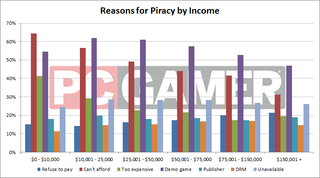
Sorted by income, the answers closely mirror those of age. There's a more obvious fall off of the 'too expensive' answer between income brackets: 40 percent at less than $10,000, and closer to 20 percent by the $25,000+ bracket.
Because we had responses from so many countries, we've divided those answers into the three charts below. These are the same countries depicted above, which all had at least 250 respondents.
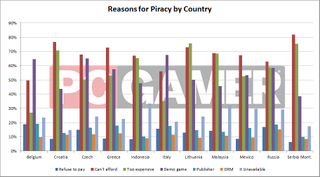
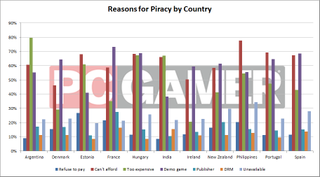
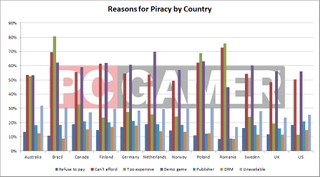
The concept of pirating games to demo them is commonplace, but significantly less popular in some countries. While about 65 percent of Belgian pirates said they wanted to demo a game before buying it, a common answer, less than 40 percent of pirates in India said the same. Croatia and Serbia had similarly low results, while having some of the highest occurrences of the 'too expensive' and 'can't afford' answers. Clearly, the bulk of pirates in those regions claim cost is their main obstacle.
In wealthier countries, like the US and UK, Finland, Germany, and Normay, fewer than 30 percent of gamers complained about the prices of games but many did say they couldn't afford them. Close to 60 these pirates wanted to demo the games before considering buying them.
Do pirates buy games?
More than 50 percent of respondents said they pirate games to demo them before buying. Does that answer really check out?
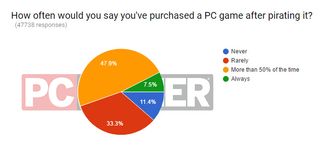
Nearly half of the respondents said they purchase games after pirating more than 50 percent of the time, while another third said they did so rarely. Overall, about 90 percent of the responses indicated that pirates do sometimes, even oftentimes, buy games after pirating them. How long after we don't know—it could be during a bargain bin sale or bundle deal, or could be as soon as they confirmed that the PC version ran well on their machine.
Why have reformed pirates stopped pirating?
Going all the way back to our first statistics, more than 90 percent of PC gamers have pirated games at some point in their lives, but only about 35 percent actively pirate today. Why did they stop? This was another check all that apply question.
44 percent said they hung up the eye patch and peg leg after an increase in income. 56 percent attributed quitting piracy to Steam sales. 50 percent said that buying games on Steam, GOG, etc. became easier than pirating them. About 22 percent just felt bad about pirating and eventually gave it up.
This question generated the most "Other" responses with nearly 7,700; we've collected some of those on the next page.

Wes has been covering games and hardware for more than 10 years, first at tech sites like The Wirecutter and Tested before joining the PC Gamer team in 2014. Wes plays a little bit of everything, but he'll always jump at the chance to cover emulation and Japanese games.
When he's not obsessively optimizing and re-optimizing a tangle of conveyor belts in Satisfactory (it's really becoming a problem), he's probably playing a 20-year-old Final Fantasy or some opaque ASCII roguelike. With a focus on writing and editing features, he seeks out personal stories and in-depth histories from the corners of PC gaming and its niche communities. 50% pizza by volume (deep dish, to be specific).
Most Popular



